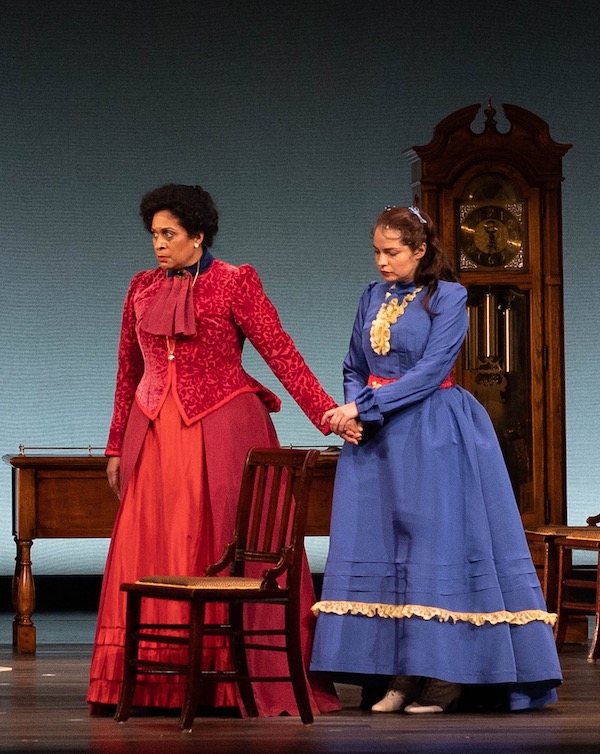Pioneer Theatre premiere explores timely public health theme in “The Messenger”

A doctor with a dire warning about a threat to the public health. A politician who warns that the doctor’s recommendations could trigger economic catastrophe. A newspaper editor driven by an agenda of her own.
If the central characters in The Messenger—Jeff Talbott’s one-act play, which received its world premiere at Pioneer Theatre Company Friday night— sound as if they’re ripped from the proverbial headlines, that could be because they are. And whether the specific threat comes from a novel coronavirus or other health hazard, the issues— individual rights vs. the common good, public health vs. people’s livelihoods, the dilemma of the whistleblower—are the same. As is the news media’s role in those conflicts.
Talbott wrote The Messenger in collaboration with director Wes Grantom just before the dawn of the present pandemic—indeed, its March 2020 reading in Pioneer’s Play-By-Play series was cut short when the world abruptly shut down.
The story has become even more relatable in the meantime. Through a minimum of speechifying and a good deal of character development, Talbott succeeds in nudging audience members to acknowledge the complexities of our current reality and wrestle with the questions he poses (but declines to answer).
The play is Talbott’s riff on Henrik Ibsen’s An Enemy of the People, with a similar plot revolving around the political fallout from a doctor’s warning about a contaminated water supply.
Like that classic drama, it’s set in rural Norway in 1882, though the smart-looking costumes and set designed by Yoon Bae are the only things anchoring it in the 19th century. Well, perhaps not the only things: A rock thrown through a window late in the play fills the role that social-media comments play nowadays.
Dr. Therese Stockman is the drama’s moral center. A laboratory in the big city has just confirmed Therese’s suspicion that the water at the mineral baths, the town’s major industry, is toxic. There is a solution, albeit one involving some short-term economic sacrifice that Stockman knows will rankle her brother, Mayor Peter Stockman. She confides in Kristine Hovstad, editor of the titular newspaper and a longtime friend. (In another nod to a bygone age, this small town has more than one newspaper, although Peter’s loyalty to rival publication The Constitution because “they report things the way I want to hear them” earned knowing laughter from Friday’s audience.)
Ora Jones’ nicely nuanced portrayal of Therese shows us a conflicted hero who realizes too late that the flip side of her idealism is naiveté. We see her certainty and composure erode until she desperately pleads for her community to meet “in the middle of the room” and finally erupts in frustration and rage before collecting herself again and resolving to continue her fight.
Mark H. Dold, as the pragmatic Peter, has crackling chemistry with Jones. The siblings’ Sorkinesque banter in the opening scene is so exhilarating that it’s startling when Therese later reveals that Peter’s constant interruptions and cross-talk make her feel unseen. Peter’s surprise at his sister’s resentment likewise feels genuine. The moment is a reminder of the trap of talking past one another.
Meredith Holzman’s Kristine is morally murky, cloaking her agenda in friendly concern and blithely dismissing repercussions and responsibility with a quip: “We’re The Messenger, not the message.” It’s to the actor’s credit that the audience is as surprised as Therese and Peter when Kristine reveals her power play—one that, while unpalatable, just might save the town.
Turna Mete plays Therese’s daughter, Petra, with self-possession and pluck as the young woman confronts her own ethical dilemma without dithering. Grayson DeJesus is so affable as Petra’s boyfriend, Einar Billing, that it is disappointing when he leans into his personal ambition.
Barzin Akhavan is the hapless everyman Henrik Abelman, who poignantly reminds us that whether the dilemma is environmental or economic, it’s the people at the bottom of the ladder who pay the biggest price.
That message is articulated even more bluntly by Alexis Grace Thomsen, ringleader of a handful of characters in modern dress who crash through the play’s fourth wall: “I’m sick of being told ‘fix it’ by the people who made the problem in the first place.”
The Messenger runs through Jan. 29. pioneertheatre.org.